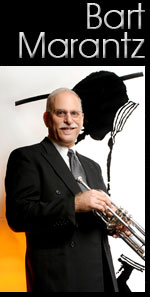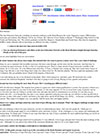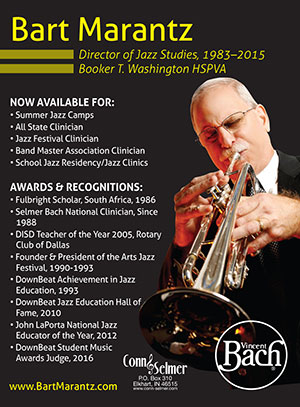 Home B.M.P. BTWHSPVA Articles Interviews Reviews Books Biography Videos Photos Calendar Music Links Contact Sara Marantz Matt Marantz Luke Marantz
Bart Marantz NPR/KERA Jazz Education Interview    Click below to listen to the interview  Click below to read the article 
|
Interviews  To view scans of the interview click the following pages: 1, 2, 3, 4.
To view scans of the interview click the following pages: 1, 2, 3, 4.
Marcus Roberts On tour in the eastern part of the U.S., Bart Marantz caught up to Marcus Roberts and discussed topics ranging from styles to jazz education. The following pages contain the conversation that went on. Bart Marantz: You went to Florida State University in Tallahassee. Did you graduate from there? Marcus Roberts: No, I did complete about 130 hours of formal education while at the school. I was a classical piano performance major and played in the F.S.U. big band as an elective course added to my degree plan. I went to Florida to study with a Romanian pianist who came straight from the "Lhevine school" at Julliard in New York. This was my primary reason for attending Florida State University. His name was Lipovetsky and he was very familiar with the Russian philosophy of piano which was something I wanted to learn. Marantz: Was playing in the F.S.U. big band a new experience for you or did you play jazz music to a great degree prior to going to college. Roberts: Well yes, I had played jazz music prior to entering college. Bill Kennedy, jazz studies director at F.S.U., helped me a great deal by bringing in people like Marion McPartlin to hear my playing while I was there. The balance between Lipovetsky and the jazz program was a great help to me. My teachers wanted me to experience the full range of development that I could while under their direction. Marantz: So you feel that it's important for any student to explore both sides of music, classical and jazz to develop as a "full" musician? Roberts: Well yes, I think so. I mean at twelve years old I knew that I was going to play jazz music. But here's the thing. You could know that and that's great. But you have to have some idea of how you're going to arrive there. Not only where the music is concerned, but a lot of it is learning how to deal with people and learning how to benečt from the knowledge they have. Both Bill Kennedy and Lipovetsky gave a great deal of themselves to try and develop the talent they saw in me. I was very fortunate to have them helping me and watching out for my best interest. I really didn't have the savvy to know what to accept and what to turn down on gigs. Without them I would have made some bad decisions, I'm sure. Marantz: You won the "Young Talent Award" from then NAJE in 1981 and you appeared at the 1982 conference. Do you feel that this performance made a difference in your career? Roberts: The critical thing that came out of the award and subsequent performance was that I was able to čnd a way to communicate with Winton (Marsalis). I was on a trip with my high school the year before in Europe and heard Winton at the Montreaux Jazz Festival for the črst time. I was blown away not only by his music, but by his the presence on stage. He was completely in command both musically and as a leader. I was able to get his phone number from his dad at the conference and we talked over the phone from another year and a half before I got to see him in person again. The sources of available resources at the annual conference is second to none and this made the difference for me and my future. Marantz: You have mentioned Winton to me a number of times during our conversation this morning. Do you remember coming with him to the Arts Magnet, now the Booker T. Washington High School for the Performing and Visual Arts and hearing a young trumpet player for the črst time in the late eighties? Roberts: Yes, but I must tell you that I really didn't want to go on that clinic. We had played the night before in Fort Worth and I simply didn't want to get up at 7a.m. to go to some high school and play for a bunch kids. I asked Winton, "Who is over there that's so important that I need to get up and go over there?" He said he didn't know, but you just never really know when you will hear someone special. Someone who will change things and by going you will have been there when it was going down! I said," I don't think so Winton, but I will go". I remember the band čreing up and the lead trumpet played the črst solo. I leaned over to Winton and said, "Who in the hell is that"? He was not only screaming high As, but was playing some great jazz. It was quite evident that Roy Hargrove was a very special musician. We were all very excited to be there and hear this young talent. We all knew he just couldn't miss. Marantz: Then you were convinced that his was another voice in jazz that was going to be heard? Roberts: Oh, yes. There was no question that Roy had the arrogance and ability to play even back then. I told him that day that it was obvious that he could hear and this was a big part of it. We were playing after the main performance in another part of the school in a master class and he was "playing" on changes he had never heard before. I told him that basically what he needed at that point in time was the development of technical pročciency and to learn as many tunes as he could. Marantz: Have you played with Roy since that meeting and are there any plans for perhaps a future musical meeting? Roberts: Yes. We did a duet thing together in New York not long ago that involved a radio station. It was fun. You know I think he is a very courageous young man. He keeps his band working over 100 days a year playing jazz music. One thing is for sure, he changed my attitude on going to do clinics! After that experience I have incorporated them into my travels when I am playing around the country. I realized that this is a very important part of being a musician and there are some young musicians who I may be able to inëuence by my presence. As a result I try to do these master class clinics often. You never know who you will hear! Marantz: So you think that these kinds of clinics and master classes are important? Roberts: Oh, yes. You see, back then I wasn't in touch with the importance of education and where the young artist were. I was concentrating on playing Winton's music. At this point I want to say that this is the only way we are going to effectively increase the knowledge of the music and bring the level of performance up to new highs. It's critical that we embrace young musicians, go and hear them play as well as help in their pursuit of excellence. Marantz: Have you ever given thought to running your own educational jazz program? Roberts: Yes. I would like to be more involved with the jazz education movement. Marantz: Well, what kind of curriculum would you like to see in your program. Would it be more toward performance or teaching jazz improvisation? Roberts: Well, I would be very interested in teaching the styles of jazz and to try to help the students out their own individual personalities and evolved style. The črst thing most players need to learn is how to play on the blues. This is an intregal part of playing jazz music. It's also very important to understand the technical break down of a given piece of music and that's part of being a musician. I'm talking about presenting something of sophistication to a sophisticated public. You can't walk out on to stage with the idea that it's all right to be ignorant of what I'm up here to do. I'm not one who prescribes this type of attitude. Marantz: Do you feel that there is not enough teaching of rooted musicians and their music? Roberts: I would say emphatically that this is the case. I feel this is a problem on both the high school and collegiate level. I never hear a college band play an authentic Duke Ellington arrangement. I realize that a lot of this is because these performances are based on what that director was taught by his/her teacher. Here's the problem: most people who teach on the collegiate level are trying to čnd something that will be played in a modern format. Most people think of the word arrangement. I realize that a lot of this is because these performances are based on what that director was taught by his or her teacher. Here's the problem: most people who teach on the collegiate level are trying to čnd something that will be modern from a chronological stand point. I went through this when I was fourteen and the issue was, well ok, but what are people doing right now. I had the older recordings too, but I gravitated to what was happening now. It took me a long time to begin to realize the immense value there was in the heritage of the music. As a result, when I play now I don't think of a be-bop piece as a be-bop piece when I play it. I think of it as a piece of music that at the time of it's writing was played in a certain way, but it is not limited by any means to having to articulate it necessarily in a strictly be bop style. I'm saying if I am playing Cherokee I am not necessitated in articulating it as a be-bop based tune. I may want to take the tune into a New Orleans feel or perhaps incorporate both styles together and present the music this way. I don't put myself in a be bop state of mind to play a be bop tune. Marantz: Do you feel this is something that should be taught in our colleges and universities? Roberts: It's critical from the standpoint of philosophy. Most schools are teaching the chord scale relationships and that's čne. The essence of playing though is "hearing" the music. So in many cases you're teaching people to contrive academic reëexes. What we have to do is teach young musicians how to hear a spiritual reaction and reëex to the music knowing the academic side as well? The problem today is that we simply don't have all these clubs, in say, Harlem where you can go hear the ledgends. Now if I am not going to come up with what that curriculum should be then I have no room to complain. It's extremely hard to čnd something that is going to work for the masses. Marantz: Are many of the players you hear coming out of our colleges and universities very clinical sounding? Roberts: They don't in many cases have the real faith and belief that you can hear in some players. In fact they are taught in many cases to play it safe. As a teacher I think giving, say, čve different examples from čve different periods not limiting the type of ensemble would be a very good way to start. Say the črst moment of a Beethoven String Quartet, then perhaps "A love Supreme" (Coltrane), then move on to Billy Holiday and perhaps some baroque music and čnish with Duke Ellington. Then I would tell the students that these types of music come from different continents and then explain through the music that they came from different cultural situations and problems that had to be met. Explain here's what they did in Europe and here's is what we did. The students need to know about all of it. Not just one part of music. Don't exclude anything! It makes it very clear that a string quartet can do the same thing that the Coltrane quartet did; you just have to listen for it! Marantz: You were just appointed musical director of the Lincoln Center Orchestra. There was an under thirty rule presented to the musicians in the ensemble. What's going on and how do you see this action taken by management effecting the ensembles ability to run business as usual? Roberts: Well, to start with I guess I would be out of a job if this was going to happen as I just turned thirty! I really think that the entire thing was blown out of proportion by the media. The letter should not have been written and it was interpreted very negatively. The real issue should have been and always should be, is the music to be played correctly and upheld to a standard of high excellence. It was quite obvious that the music was being played quite well. The age discrimination was dropped about as soon as it was started. Winton was the founder of this wonderful orchestra and he did it himself. I mean he really worked his tail off to create this wonderful ensemble and then as soon as it's a winner a bunch of people jump on the wagon and start to tell the public what it should have been and what it ought to be. The orchestra is about presenting a complete spectrum of the music. The Lincoln Center program is only three years old and we need to give it a chance to grow and simply get off the ground. |


